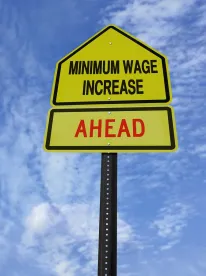On December 20, 2018, Mayor Jim Kenney signed an ordinance that will raise the minimum wage for all Philadelphia municipal government workers, contractors, and subcontractors from the current rate of $12.20 per hour to $15.00 per hour by 2022. Starting in 2019, the minimum wage will gradually increase as follows:
-
$13.25 on July 1, 2019
-
$13.75 on July 1, 2020
-
$14.25 on July 1, 2021
-
$15.00 on July 1, 2022
From July 1, 2023, forward, the minimum wage will continue to increase pursuant to a calculation based on the Consumer Price Index for all Urban Consumers.
In addition to workers for the City of Philadelphia, the new ordinance applies to employees of entities with new, renewed, and amended contracts with the City of Philadelphia. This includes (1) for-profit service contractors that receive or are subcontractors on contracts for $10,000 or more from the city in a 12-month period and have annual gross revenues of more than $1,000,000; (2) nonprofit service contractors that receive or are subcontractors on contracts from the city for more than $100,000 in a 12-month period; (3) recipients of city leases, concession agreements, or franchise agreements, or subcontractors or sub-recipients of those agreements; (4) public agencies that receive contracts for $10,000 or more from the city in a 12-month period; and (5) recipients of financial aid from the city.
A financial aid recipient is defined as (1) any person or entity that receives direct assistance from the City of Philadelphia “in the form of grants, loans, or loan guarantees, tax incentives, in-kind services, waivers of City fees, or real property in the amount of more than $100,000 in any twelve (12)-month period”; or (2) a person or entity “who (a) leases property or equipment from a City financial aid recipient; (b) employs more than twenty-five (25) employees; (c) in the case of a not-for-profit entity, leases the property or equipment for consideration in excess of $100,000 a year; and (d) in the case of a for-profit entity, has annual gross receipts in excess of $1,000,000 a year.” Financial aid recipients must comply with the ordinance for five years following receipt of aid.




 />i
/>i

